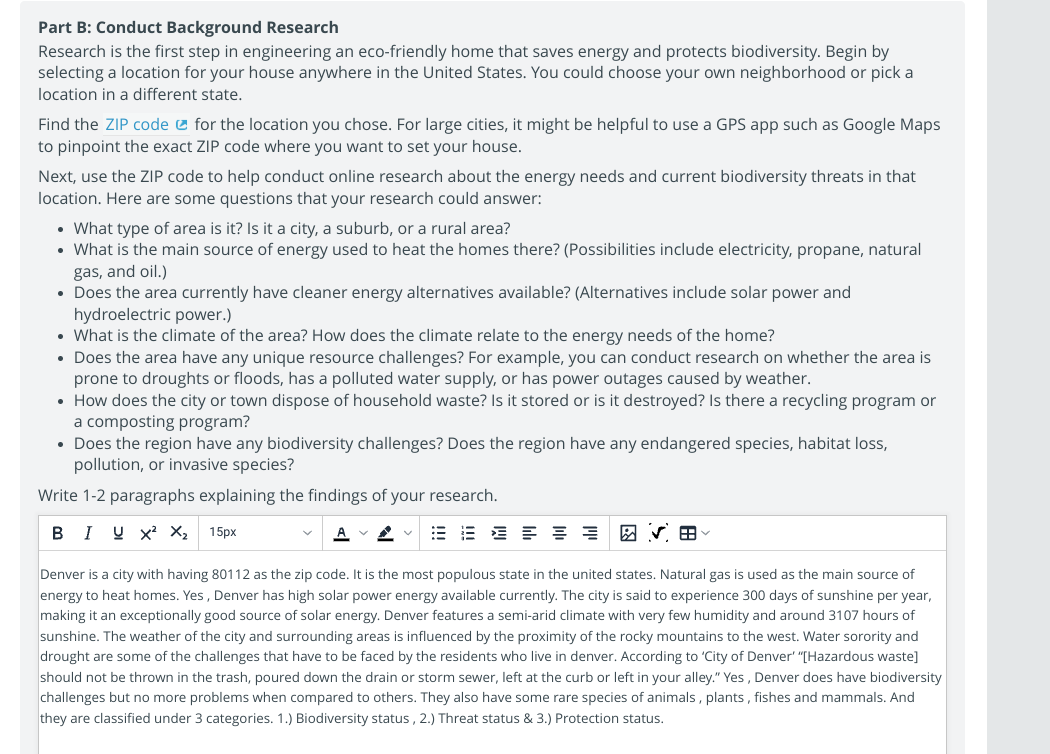Answered step by step
Verified Expert Solution
Question
1 Approved Answer
Part B: Conduct Background Research Research is the first step in engineering an eco-friendly home that saves energy and protects biodiversity. Begin by selecting

Part B: Conduct Background Research Research is the first step in engineering an eco-friendly home that saves energy and protects biodiversity. Begin by selecting a location for your house anywhere in the United States. You could choose your own neighborhood or pick a location in a different state. Find the ZIP code for the location you chose. For large cities, it might be helpful to use a GPS app such as Google Maps to pinpoint the exact ZIP code where you want to set your house. Next, use the ZIP code to help conduct online research about the energy needs and current biodiversity threats in that location. Here are some questions that your research could answer: What type of area is it? Is it a city, a suburb, or a rural area? What is the main source of energy used to heat the homes there? (Possibilities include electricity, propane, natural gas, and oil.) Does the area currently have cleaner energy alternatives available? (Alternatives include solar power and hydroelectric power.) What is the climate of the area? How does the climate relate to the energy needs of the home? Does the area have any unique resource challenges? For example, you can conduct research on whether the area is prone to droughts or floods, has a polluted water supply, or has power outages caused by weather. How does the city or town dispose of household waste? Is it stored or is it destroyed? Is there a recycling program or a composting program? Does the region have any biodiversity challenges? Does the region have any endangered species, habitat loss, pollution, or invasive species? Write 1-2 paragraphs explaining the findings of your research. BIU X2 X2 15px Denver is a city with having 80112 as the zip code. It is the most populous state in the united states. Natural gas is used as the main source of energy to heat homes. Yes, Denver has high solar power energy available currently. The city is said to experience 300 days of sunshine per year, making it an exceptionally good source of solar energy. Denver features a semi-arid climate with very few humidity and around 3107 hours of sunshine. The weather of the city and surrounding areas is influenced by the proximity of the rocky mountains to the west. Water sorority and drought are some of the challenges that have to be faced by the residents who live in denver. According to 'City of Denver' "[Hazardous waste] should not be thrown in the trash, poured down the drain or storm sewer, left at the curb or left in your alley." Yes, Denver does have biodiversity challenges but no more problems when compared to others. They also have some rare species of animals, plants, fishes and mammals. And they are classified under 3 categories. 1.) Biodiversity status, 2.) Threat status & 3.) Protection status.
Step by Step Solution
There are 3 Steps involved in it
Step: 1

Get Instant Access to Expert-Tailored Solutions
See step-by-step solutions with expert insights and AI powered tools for academic success
Step: 2

Step: 3

Ace Your Homework with AI
Get the answers you need in no time with our AI-driven, step-by-step assistance
Get Started


